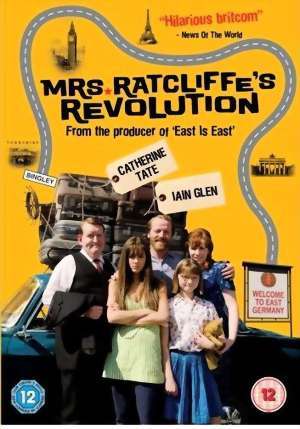
MRS RATCLIFFE’S REVOLUTION
UK, 2007, 102 minutes, Colour.
Catherine Tait, Iain Glen, Brittany Ashworth, Heike Makatsch, Jessica Barden, Christian Brassington, Nigel Betts.
Directed by Bille Eltringham.
Mrs Ratcliffe’s Revolution is a comic look at England in the 1960s and 70s and a comparison with East Germany.
Iain Glen portrays Frank Ratcliffe, an enthusiastic communist who gets the opportunity to go to teach English Literature in East Germany. His younger daughter Mary (Jessica Barden) is always enthusiastic about her father and his causes. However, the teenager Alex (Brittany Ashworth) is very much anchored to her hedonistic lifestyle in England. Catherine Tait is Dorothy, the daughter of a man who fought in the Spanish civil war for the communists. His mythology influences the family and herself and her rather simple brother, Uncle Philip (Nigel Betts) who lives with the family. Reluctantly, Dorothy agrees to go to East Germany.
While the film has a broad look at England at the time, it is also satirical of the drabness of life in Germany. The buildings, the streets, the spies and reporting, the bureaucracies, the hard censorship all take their toll on Dorothy. Feeling that she has simply been a housewife and mother, she starts to help people, get a better awareness, assists a young man to escape by crashing through the barriers between East and West Germany. Finally, she takes it into her hands to take her family back to England.
There is a comic-dramatic climax for the whole film – with some comic touches as the family escapes in a balloon.
Catherine Tait has a strong reputation for television comedy and acquits herself very well as Dorothy Ratcliffe. Other films about East Germany include Regis Wagnier’s East West, Goodbye Lenin and The Lives of Others.
1.British comedy? Characters, satire? The 60s and its atmosphere? Communism and capitalism?
2.England, the family home, school, demonstrations? The contrast with East Germany, its dinginess, dilapidated buildings, the school, warehouses? The musical score?
3.The film’s attitude towards communism, towards capitalism? Strengths and weaknesses?
4.Mary’s voice-over, her age, her essay about her family, her condemnation of her sister, admiration for her father, no mention of her mother? Ideology? Supporting her father? At home? Uncle Philip?
5.Dorothy, as a person, the memories of her father and his fighting in the Spanish civil war, her love for Philip? Housewife? Her children ignoring her? Her love for Frank? Alex and boys? In the house? Subservient? Dominated by her father’s reputation?
6.Frank and his enthusiasm, his place in the family, his taking Dorothy for granted, ideology, demonstrations? Slogans? At school? The move, making the family vote?
7.The animation to illustrate the journey during the credits and during the film?
8.East Germany, the guards, their laughing at anybody wanting to come into the country? The building for their home, the toilet, the manager and her using the toilet? The school? The workplace? Clubs, sport, activities? The warehouse, for Alex and the young people?
9.The people in East Germany, the guards, Anna and her gruffness? The people arrested? The spies? Ingrid and her place in the school, as a spy, recruiting Mary? The information given to the authorities, the interrogations?
10.Frank and his classes, trying to teach English, Shelley and his being censored? Ingrid and her infatuation, the kiss, Alex’s reaction? His liking East Germany? With Dorothy, with the children?
11.Alex and her rebellion, smoking, the music, clothes, boys?
12.Philip, taking photos, his job and liking it, the arrest, the interrogation with Dorothy, her putting her foot down? The manager, his taking photos of her, her anger, understanding, in love, deciding to stay?
13.Thomas, arts, football? The severity of his father, the principal, (**right one?) with Dorothy, driving, crashing through the fence and his escape?
14.The interrogation, the officer, his wanting to escape, contacting Dorothy, the manager and the deals, the money, getting the documents, their fear, their falling into the river? His leaving by himself?
15.Dorothy and her decision, her experience? The documents? The means of escape? The parade, Frank’s speech? Mary and her running? Mary finally agreeing to go? The government representatives, the parade? The balloon, the family getting into it? The applause for the escape?
16.The blend of the serious and the comic? Its memories of communism and East Germany – especially in the light of the end of the Soviet Union and the unification of Germany?